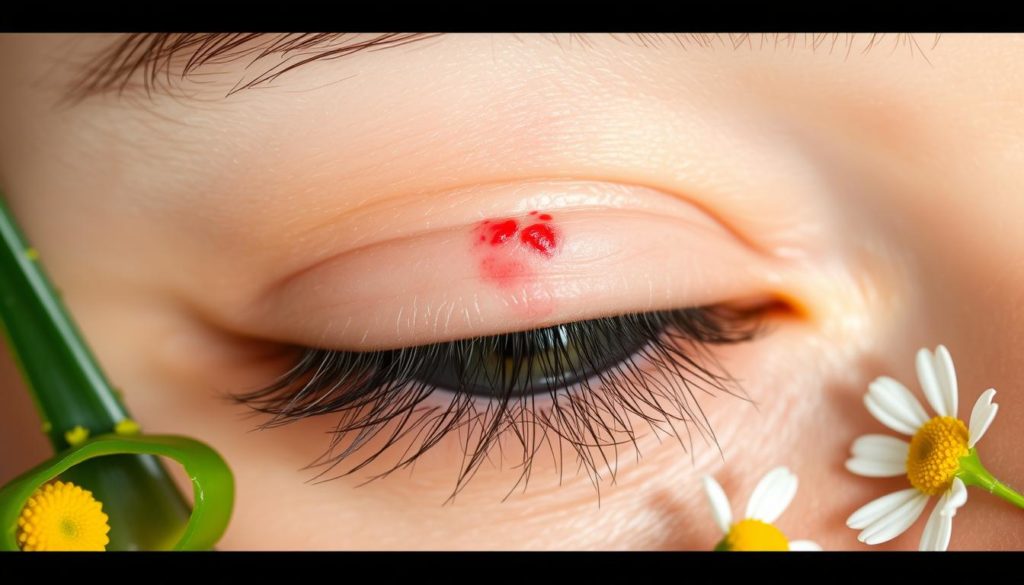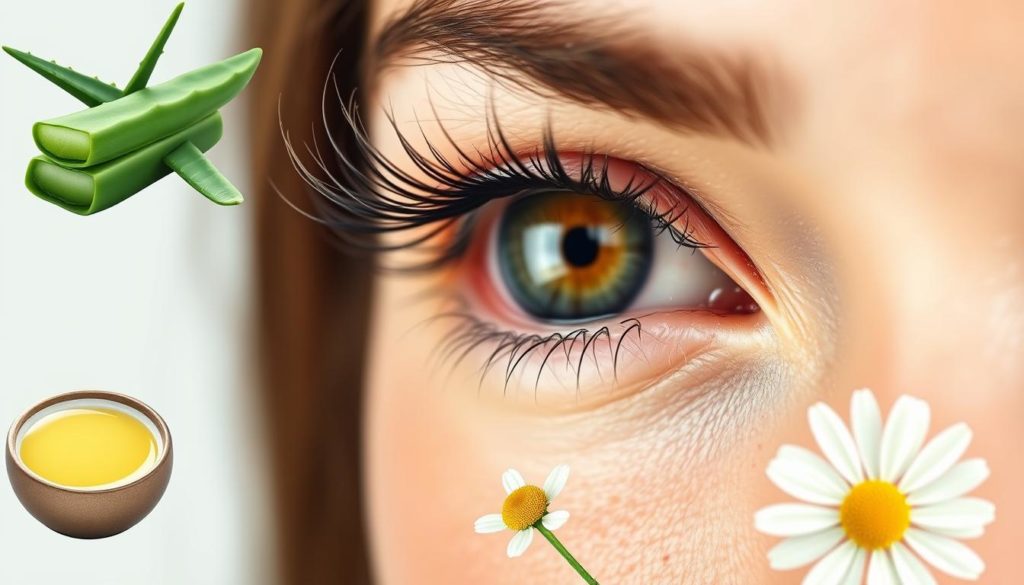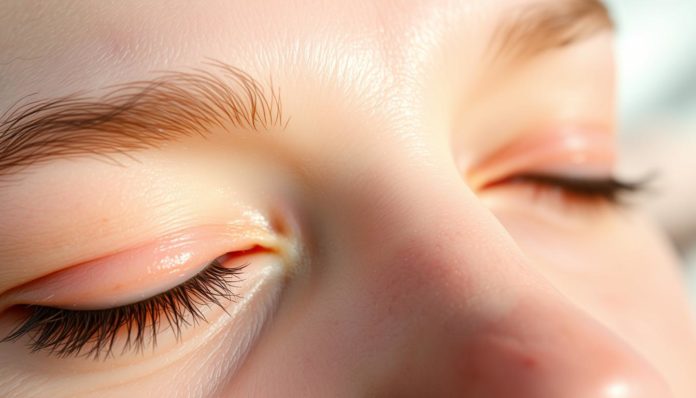About 15% of Americans deal with dry eyelids at some time. This skin, especially around the eyes, often gets flaky, itchy, and sore. This can happen because of the air around us or lasting health issues. Dealing with these skin problems can be tough and long-lasting.
Knowing why it happens and how to treat it can make a big difference. There are many ways to help your skin, from easy-to-buy products to specific treatments. This guide will show you key methods to soothe dry eyelids and improve your eye care routine.
Understanding the Anatomy of Eyelid Skin
The skin around your eyes is very thin and sensitive. This makes it easy to get dry and irritated. It’s especially true for *dry skin around eyes*, which can get worse due to aging and the environment.

As you get older, your eyelid skin loses moisture and fats that protect it. This leaves the skin more likely to become dry and flaky. The thin skin on your eyelids can have more problems because it becomes less elastic and dry over time.
To prevent dryness, it’s important to understand how your eyelid skin works. Make sure you stay hydrated and use products meant for eye care. By caring for your eyes early, you can avoid problems and keep your skin looking healthy and bright.
Common Symptoms of Dry Eyelids
Having dry eyelids can be annoying and hard to deal with. Symptoms can be mildly annoying to very severe. They affect your day-to-day life. Let’s look at the usual signs of this problem.
Itchiness and Discomfort
Itchy eyelids are a key sign of dry eyelids. This irritating feeling can make you rub your eyes more. This only makes things worse. The discomfort from itchy eyelids can mess with normal activities. It’s key to find out the dry eyelids causes and treatments.
Flaking and Cracked Skin
Flaky skin on the eyelids is another common issue. This happens when the eyelid’s skin loses moisture and begins to dry up. Then, it can flake off. This may also lead to painful cracked skin. This raises the chance of infection. Keeping the skin moist and getting the right treatments is important to manage this.

Redness and Irritation
Redness and feeling irritated are signs too. The skin around the eyes might look red and feel tender. This could be from many things like the environment or skincare products. Knowing the common dry eyelids causes and treatments helps ease these symptoms. This will help make your eyes feel better.
Main Causes of Dry Eyelids
Dry eyelids trouble many people today. Knowing why they happen and related eyelid skin issues is key for good care and keeping them at bay.
Aging and Decreased Moisture
As time passes, our skin holds less moisture. This is a big reason for dry eyelids causes as we get older. With age, drier skin becomes more common, and dry eyelids often follow.
Contact Dermatitis and Irritants
Irritation from contact dermatitis is another major reason for dry eyelids. It’s a response to irritants or allergens like some makeup, skincare products, or shampoos. Figuring out what’s causing the reaction helps tackle eyelid skin issues.
Environmental Factors
Our surroundings play a huge part in dry eyelids causes too. Cold climates or dry air take away skin’s natural moisture. This leaves our skin dry and irritated.
Eczema and Dry Eyelids
Eczema, also known as atopic dermatitis, often targets the eyelids’ thin skin. It appears as red, itchy patches that bring a lot of discomforts. Knowing what triggers this and how to treat it is key.
Understanding how eczema treatments and other remedies for dry eyelids work together is useful. When eczema flares up, the skin may become very dry, cracked, and painful. Finding the best treatment combo is essential for relief and protection.
Here are some important tips for managing eczema on your eyelids:
- Avoiding Triggers: Find out what causes your eczema to flare up and stay away from those things.
- Moisturization: Keep the skin around your eyes moist to stop it from getting too dry and cracking. Use creams and ointments that add a lot of moisture.
- Topical Treatments: Using mild steroid creams or other medicines can lower inflammation and itching when eczema gets worse.
Now, let’s compare some dry eyelids remedies that work well for eczema patients:
| Remedy | Benefits | Drawbacks |
|---|---|---|
| Emollient Creams | Highly moisturizing, strengthens the skin barrier | May feel heavy for some users |
| Hydrating Gels | Lightweight, absorbs quickly | May require frequent reapplication |
| Natural Oils | Provides deep nourishment, soothes irritation | Potential for allergic reactions in some individuals |
Managing eczema on eyelids effectively requires avoiding triggers, moisturizing regularly, and using the right treatments. Following these steps carefully can help control symptoms. It makes life better for those dealing with eczema.
Treatment Options for Dry Eyelids
Having dry eyelids can be a real annoyance. Luckily, there are many ways to find comfort. You can use over-the-counter moisturizers or get prescription treatments. Each option tackles the problem effectively.
Over-the-Counter Moisturizers
Using over-the-counter moisturizers is a simple solution. Look for products that contain oils and glycerin. These ingredients help keep moisture in. Brands like CeraVe and Neutrogena make special items for sensitive skin that ease dryness.
Topical Steroids and Calcineurin Inhibitors
For tougher cases, doctors may suggest steroids or calcineurin inhibitors. These treatments help lessen inflammation and bring quicker relief. Always use them as your doctor advises to stay safe from side effects.
Home Remedies and Lifestyle Changes
Prefer natural options? There are home solutions and changes you can make. A humidifier can help keep your skin less dry. Using fragrance-free skincare stuff also irritates less.
- Keep your environment humidified.
- Use mild, hypoallergenic skincare products.
- Apply coconut oil or aloe vera gel for natural moistening.
- Avoid hot showers and baths that are too steamy.
Merge these strategies into your daily life for improved control over dry eyelids. With these methods, finding relief becomes easier.
Preventing Dry Eyelids
To prevent dry eyelids, it’s key to follow some habits. Keeping a humid environment helps with hydration. Use humidifiers during dry seasons to moisten the air.
Lower the shower water temperature. Hot water can remove the skin’s natural oils, making it dry. Use lukewarm water for showering instead.
Always apply moisturizers, especially after bathing or washing your face. Pick moisturizers for sensitive skin to avoid irritation. Be sure to test new products on a small skin area first.
- Use non-irritating soaps and detergents.
- Stay hydrated by drinking plenty of water every day.
- Wear sunglasses to shield your eyelids from wind and sun.
Here’s a look at the best products to soothe dry eyelids:
| Product | Key Features | Suitable For |
|---|---|---|
| Neutrogena Hydro Boost | Hyaluronic Acid, Fragrance-Free | All Skin Types |
| Cetaphil Daily Hydrating Lotion | Lightweight, Non-comedogenic | Dry to Normal Skin |
| Vanicream Moisturizing Cream | Dye-Free, Non-Greasy | Sensitive Skin |
Managing Dry Eyelids During Seasonal Changes
Seasonal shifts often bring dry, irritated eyelids. Here are tips to soothe and manage them effectively.
Using Humidifiers
Keeping the right humidity at home is key when seasons change. A humidifier keeps air moist, helping your eyelids. This easy step can ease your discomfort significantly.
Warm Water for Bathing
For treating dry eyelids, water temperature matters. Bathing with warm water helps keep essential oils in your skin. This keeps your eyelids moist. Also, avoid staying too long in water to protect your eyelid skin.
Avoiding Harsh Soaps and Detergents
It’s important to avoid harsh soaps and detergents. These can make dryness and irritation worse. Choose gentle, hypoallergenic cleansers instead. They help soothe your eyelids. Changing your skincare with the seasons keeps your eyelids happy.
Dry Eyelids Causes and Treatments
Dry eyelids can be caused by many things like eczema, contact dermatitis, and the environment. Age also plays a role because our skin gets drier as we get older. Using harsh skincare products or being in bad weather can make it worse.
Treating dry eyelids means finding the right solution for the cause. Moisturizers from the drugstore can help with general dryness. If you have conditions like atopic dermatitis or blepharitis, you might need special creams or antibiotics. It’s best to get advice from a doctor for treatments that really work.
Small changes in how you live can improve dry eyelids. Use a humidifier, pick mild skincare items, and don’t take long, hot showers. For more tips and treatments, see this guide on dry eyelids causes. Combining good skincare, changes in your routine, and expert advice will keep your eyelids feeling better.
FAQ
What causes dry eyelids?
Dry eyelids come from various sources. Aging lessens skin’s moisture. Allergens like makeup cause contact dermatitis. Cold weather or low humidity also play a role.
What are the common symptoms of dry eyelids?
The main signs are itchiness, flaking, and cracked skin. You might also see redness and feel discomfort. These can disrupt daily life.
How can I treat dry eyelids at home?
Try over-the-counter moisturizers with oils and glycerin for mild cases. Home strategies include a humidifier, avoiding harsh soaps, and using warm water. These steps can soothe your eyelids.
When should I see a doctor for dry eyelids?
See a doctor if symptoms continue or discomfort is severe. Persistent issues might point to eczema or something more serious needing a doctor’s care.
What are some preventive measures for dry eyelids?
To prevent dryness, keep your surroundings humid and use gentle skincare. Lower your shower temperature. Apply moisturizers regularly. Avoid skincare and makeup irritants.
How do seasonal changes affect dry eyelids?
Colder weather makes dry eyelids worse by lowering humidity. This takes away natural oils. To lessen this, manage indoor humidity, use warm water, and skip harsh soaps.
Can eczema cause dry eyelids?
Yes, eczema can lead to dry, itchy eyelids. Consistently treating eczema and avoiding triggers can control it.
Are there prescription treatments for dry eyelids?
For tough cases, doctors might prescribe steroids or other medicines. These can calm inflammation and ease symptoms.
What lifestyle changes can help in treating dry eyelids?
Small lifestyle tweaks can help. Use a humidifier to moisten the air. Choose gentle skincare products. Avoid being in harsh weather too long. These steps can aid in treatment and prevention.


